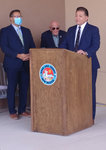Wind: mph,
Welcome to our new web site!
To give our readers a chance to experience all that our new website has to offer, we have made all content freely avaiable, through October 1, 2018.
During this time, print and digital subscribers will not need to log in to view our stories or e-editions.




“It’s going to be a game changer for Doña Ana County and the City of Las Cruces,” Las Cruces Mayor Pro Tempore Kasandra Gandara said about the county Crisis Triage Center (CTC).
Gandara and County Commission Chair Manuel Sanchez cut the ribbon on the facility during a May 26 event hosted by the Greater Las Cruces Chamber of Commerce. The CTC will open as soon as a pharmaceutical license has been approved, which could happen any day, county Health and Human Services Department Director Jamie Michael said.
The CTC will be a place for people who are dealing with a mental health crisis -- providing on-site services, peer support and referrals to other community services.
It will also be a drop-off point for law-enforcement officials dealing with individuals in crisis. Previously, the only options for police officers and deputy sheriffs had been to transport them to either a hospital emergency room or jail.
“It’s a fundamental shift for people who are in crisis,” said Recovery Innovations International (RI) Deputy CEO Paul Galdys, who attended the ribbon-cutting.
The county hired RI last August to license and operate the CTC, which has been vacant since construction was completed in 2013. RI operates 12 similar facilities in five other states.
Galdys said RI’s Recovery Crisis Respite Program in Peoria, Arizona (a major Phoenix suburb) averages 400 drop-offs a month, with law-enforcement officials back out in the field in less than three minutes on average. He said similar drop-offs at the Las Cruces CTC should average five minutes or less.
No one who comes to the CTC will be turned away, Galdys said.
“There are far fewer issues when you take away the barriers,” he said.
Attending the CTC’s grand opening more than eight years ago was Micah Pearson’s first official act representing the National Alliance on Mental Illness (NAMI), Pearson said at the ribbon cutting. “I’m glad to see that it’s finally actually happening,” said Pearson, who is a national NAMI board member and executive director of NAMI Southern New Mexico.
County Commission Chair Sanchez called the CTC “a refuge for people in our community experiencing mental health crisis.”
“This facility is going to be much needed,” Mayor Ken Miyagishima said.
“You are going to make a difference in so many ways,” Greater Las Cruces Chamber President and CEO Debbi Moore told RI officials and the facility’s 13 staff members at the ribbon-cutting. “Know this community supports you.”
County Manager Fernando Macias said the B in the CTC’s address – 1850-B Copper Loop – stands for behavioral health and for the bravery of those who “come and accept services” and the county commissioners and other community leaders “that made this happen.”
In particular, Macias singled out County Commissioner Lynn Ellins, who was chair when the commission voted to hire RI to open the facility. Ellins had “the bravery and strength of character to say we’re going to follow a certain path,” Macias said. “He kept the faith. He took us over the finish line.”
Macias said the B in the address also stands for “break,” which is what many of those who come to the CTC are looking for, to reduce their anxiety and find a tranquil space.
“This is a place where everyone is accepted,” Macias said. “We’re not going to say no to anyone who is in this need.”
Macias also acknowledged Michael’s work in getting the CTC open. And, he recognized Michael’s predecessor, Sylvia Sierra.
“Fernando gets things done like no one I have seen,” Galdys said. “We are so very appreciative of the opportunity to serve you all.”
Karina P. Diaz will serve as CTC site director and Jess Spohn as clinical director, overseeing licensed behavioral health clinicians and peer support specialists, the county said in a news release.
Diaz moved to Las Cruces from Brooklyn, New York, where she was clinic director at Bonding Links-Enlazos Familiares Behavioral Health Services for Children and Families. She has a master’s degree in psychotherapy and is a licensed art psychotherapist and nationally registered as an infant/parent attachment specialist, the county said.
Spohn most recently worked as a therapist at Zia Recovery Center in Las Cruces. Prior to that, she was clinical supervisor and therapist at Mesilla Valley Hospital and worked with La Clínica de Familia as team lead and therapist. At New Mexico State University, Spohn was a professor in the Social Work Department and coordinator of LGBT+ programs.
Visit www.donaanacounty.org.
Other items that may interest you

